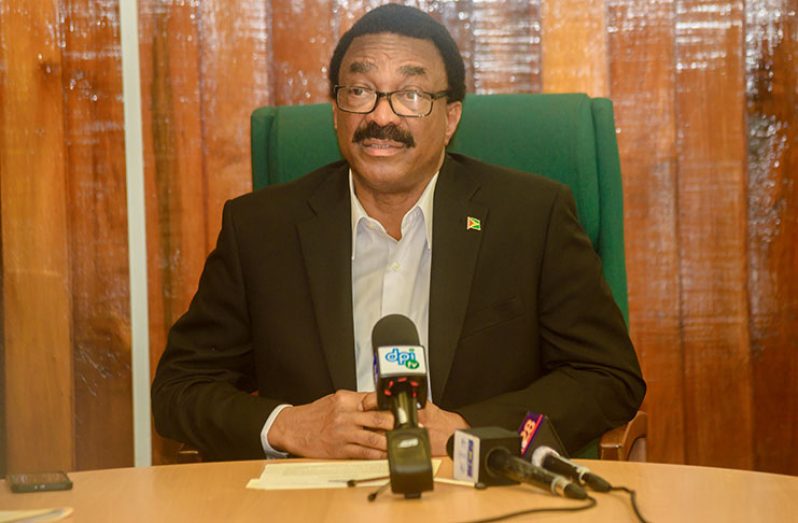ATTORNEY General and Minister of Legal Affairs Basil Williams, SC, on Saturday dismissed statements attributed to Opposition Leader and former president Bharrat Jagdeo which suggested that statements made by government ministers on the term-limit case which is currently before the Caribbean Court of Justice (CCJ) is likely to prejudice the outcome.
“I am surprised that Mr Jagdeo has problems with the CCJ. I would not get into that type of discussion. I did my talking during the hearings and I feel confident that we could leave the panel of eminent judges which adorn that bench to discharge their responsibilities,” Williams said in response to questions posed by this newspaper.
The attorney general said that there is a general concern about statements being made about court cases that are before the courts.
“Yes, there is a general concern,” he told reporters while referencing a recent press conference held by Foreign Affairs Minister Carl Greenidge on the same subject. Greenidge warned that matters placed before the courts are sub judice, meaning they are under judicial consideration and ought not to be reported on or be the subject of public discourse.
“Persons who want to have an insight into what happened in the court, they could go to the CCJ website and listen for themselves and they don’t have to be subjected to PPP propaganda,” said Williams.
However, Jagdeo at a media briefing this week referenced a recent political meeting in Berbice where Vice-President and Minister of National Security, Khemraj Ramjattan, reportedly suggested that the CCJ will rule in the government’s favour in the term-limit case.
“I don’t know whether it’s loose talk or they do have inside information as they say, but either way this could affect the credibility of the court. If they claim they have inside knowledge, it could also be entirely false,” Jagdeo stated.
Meanwhile, back in March, Williams and a battery of lawyers appeared before the full bench of the CCJ where the court was informed that two former top judicial officers here had erred in applying the Basic Structure Doctrine in the ‘third-term case’, even as he asserted that the term-limit act is valid.
Government has challenged a Court of Appeal ruling in the case brought by the relatively unknown Cedric Richardson on the presidential term-limit. The ruling was initially challenged by both the state and former Speaker of the National Assembly, Raphael Trotman. Trotman has dropped out of the case.
The state is being represented by Williams SC, Solicitor-General Kim Kyte-Thomas, State Counsel Uteika John and Barbadian Queens Counsel, Hal Gallop and Ralph Thorne, while Richardson is being represented by Douglas Mendes of Trinidad.
KEENLY WATCHED
The case is being keenly watched and many feel that Jagdeo, who served two terms as president, has played a big role in the challenge of the term-limit, but he and his party have always denied this.
Richardson of Laing Avenue, Georgetown, in a constitutional challenge just before the May 2015 General and Regional Elections, contested the amendments made to Article 90 of the constitution that were enacted in 2000 following a bipartisan Constitutional Reform Process.
Article 90 (2) states that “a person elected as President after the year 2000 is eligible for re-election only once.” He argued that that the term-limit infringes on Articles 1 and 9 of the constitution, wherein Article 1 states that “Guyana is an indivisible, secular, democratic, sovereign state in the course of transition from capitalism to socialism and shall be known as the Co-operative Republic of Guyana” and Article 9 states that “Sovereignty belongs to the people, who exercise it through their representatives and the democratic organs established by or under this constitution.”
However, Williams argued that amendments made to Article 90 are not unconstitutional. The attorney general told the CCJ that the High Court and Court of Appeal of Guyana applied the Basic Structure Doctrine in the case. He pointed out that the doctrine does not apply to Guyana and any other CARICOM country that has a constitution that mirrors the Westminster model. The Basic Structure Doctrine is an Indian judicial principle that the constitution has certain basic features that cannot be altered or destroyed through amendments by the Parliament. The doctrine applies only to constitutional amendments.
But Williams argued that “where legislation is passed in accordance with prescription — in terms of manner and form — the court ought not to inquire as to the propriety, the substance of that legislation.”
He rejected outright the use of the concept of Basic Structure Doctrine, noting that it does not apply to the Guyana Constitution. “The Act was validly passed. The only question is whether it conforms to the constrictions on Article 164 (2) (6) of the constitution. Our submission is that it did,” he posited.
Meanwhile, Solicitor-General Kyte-Thomas raised the issue of delay. She argued that while the issue of delay was not initially raised in the Supreme Court or the Court of Appeal, it is important.
“We acknowledge your honour, that there was no limitation in other constitutions in respect to the bringing of constitutional claims and seeking constitutional relief. However, the courts around this Region have spoken.”
She pointed to case law where it was ruled that a litigant cannot sit idly by and then years after go to the court seeking redress. She reminded that the court found in many instances that delay may defeat a constitutional motion.




.png)









